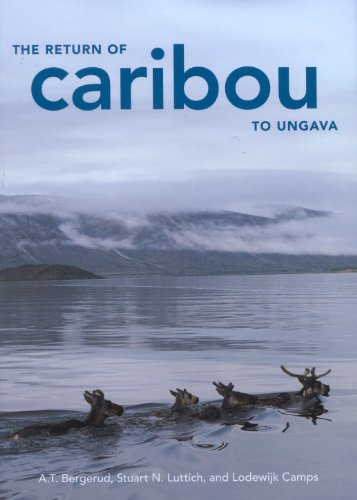The Return of Caribou to Ungava (Volume 50) (Carleton Contemporary Series) - Hardcover

"synopsis" may belong to another edition of this title.
Stuart N. Luttich, a provincial biologist in Labrador, monitored the caribou herd from
"About this title" may belong to another edition of this title.
- PublisherMcGill-Queen's University Press
- Publication date2007
- ISBN 10 0773532331
- ISBN 13 9780773532335
- BindingHardcover
- Edition number1
- Number of pages656
Buy New
Learn more about this copy
Shipping:
FREE
Within U.S.A.
Top Search Results from the AbeBooks Marketplace
The Return of Caribou to Ungava (Volume 50) (Carleton Contemporary Series)
Book Description Condition: New. Book is in NEW condition. 3.9. Seller Inventory # 0773532331-2-1
The Return of Caribou to Ungava (Volume 50) (Carleton Contemporary Series)
Book Description Condition: New. New! This book is in the same immaculate condition as when it was published 3.9. Seller Inventory # 353-0773532331-new
The Return of Caribou to Ungava (Hardcover)
Book Description Hardcover. Condition: new. Hardcover. In one of the great natural marvels of hoofed mammal demography, the George River caribou herd increased from 15,000 animals in 1958 to 700,000 in 1988 - the largest herd in the world at the time. The authors trace the fluctuations in this caribou population back to the 1700s, detail how the herd escaped extinction in the 1950s, and consider current environmental threats to its survival. In an examination of the life history and population biology of the herd, The Return of Caribou to Ungava offers a synthesis of the basic biological traits of the caribou, a new hypothesis about why they migrate, and a comparison to herd populations in North America, Scandinavia, and Russia. The authors conclude that the old maxim, "Nobody knows the way of the caribou," is no longer valid. Based on a study in which the caribou were tracked by satellite across Ungava, they find that caribou are able to navigate, even in unfamiliar habitats, and to return to their calving ground, movement that is central to the caribou's cyclical migration. The Return of Caribou to Ungava also examines whether the herd can adapt to global warming and other changing environmental realities. In one of the great natural marvels of hoofed mammal demography, the George River caribou herd increased from 15,000 animals in 1958 to 700,000 in 1988 - the largest herd in the world at the time. The authors trace the fluctuations in this caribou population back to the 1700s, detail how the herd escaped extinction in the 1950s, and consider current environmental threats to its survival. In an examination of the life history and population biology of the herd, The Return of Caribou to Ungava offers a synthesis of the basic biological traits of the caribou, a new hypothesis about why they migrate, and a comparison to herd populations in North America, Scandinavia, and Russia. The authors conclude that the old maxim, "Nobody knows the way of the caribou," is no longer valid. Based on a study in which the caribou were tracked by satellite across Ungava, they find that caribou are able to navigate, even in unfamiliar habitats, and to return to their calving ground, movement that is central to the caribou's cyclical migration. The Return of Caribou to Ungava also examines whether the herd can adapt to global warming and other changing environmental realities. Shipping may be from our UK warehouse or from our Australian or US warehouses, depending on stock availability. Seller Inventory # 9780773532335

